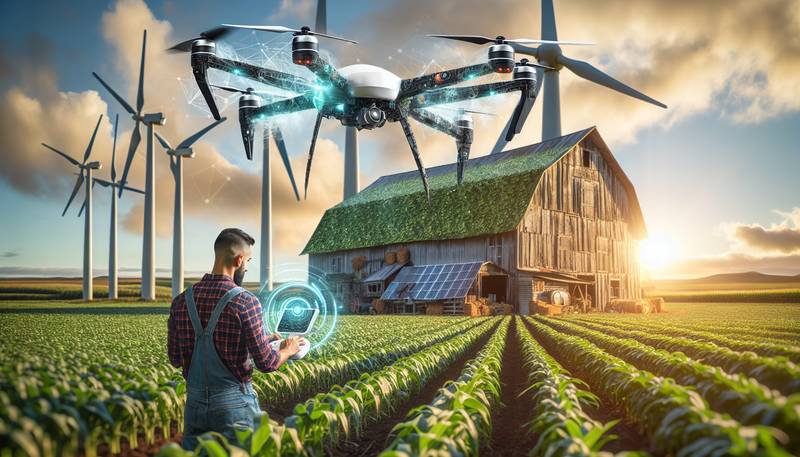Tech in Agriculture: The Rise of Smart Farming

With the rise of technological advancements, the agriculture industry has seen a significant shift in the way it operates. Smart farming, also known as precision agriculture, is a modern farming approach that utilizes various advanced technologies to enhance crop yield and production. This new way of farming is transforming the agricultural landscape, making it more efficient and sustainable.
The Evolution of Agriculture
For centuries, farming has been a labor-intensive industry that required a significant amount of human effort. However, with the advent of technology, the industry has evolved drastically. Today, farmers are using drones, satellite imagery, and GPS technology to monitor their crops and make informed decisions about planting, watering, and harvesting.
The Benefits of Smart Farming
The benefits of smart farming are numerous. By using technology, farmers can now collect and analyze data about their crops, soil, and weather conditions. This data allows them to make more informed decisions about when to plant and harvest their crops, resulting in higher yields and reduced waste. Additionally, smart farming can help farmers save on resources such as water and fertilizer, as they can use these inputs more precisely and only where they are needed.
Increased Efficiency
Smart farming can help farmers increase their efficiency by automating tasks that were once done manually. For example, tractors can now be equipped with GPS systems that allow them to drive themselves, freeing up farmers' time to focus on other tasks. Similarly, drones can be used to monitor crops, identify pests and diseases, and even spray pesticides, reducing the need for manual labor.
Sustainability
Smart farming can also help farmers reduce their environmental impact. By using precision agriculture techniques, farmers can reduce the amount of water, fertilizer, and pesticides they use, which can help conserve natural resources and reduce pollution. Additionally, smart farming can help farmers reduce their carbon footprint by optimizing their use of fuel and energy.
The Role of Data
Data is at the heart of smart farming. By collecting data on various aspects of the farming process, farmers can make more informed decisions about their crops. For example, soil sensors can provide data on soil moisture levels, allowing farmers to water their crops more efficiently. Similarly, weather data can help farmers identify the best time to plant and harvest their crops, reducing the risk of crop failure due to adverse weather conditions.
The Challenges of Smart Farming
Despite the many benefits of smart farming, there are also challenges to overcome. One of the biggest challenges is the cost of implementing these technologies. Many farmers may not have the financial resources to invest in these advanced tools, making it difficult for them to take advantage of the benefits of smart farming.
Access to Technology
Another challenge is the access to technology. In some rural areas, the infrastructure may not be in place to support the use of advanced technologies. This can make it difficult for farmers in these areas to implement smart farming practices. Additionally, some farmers may lack the technical knowledge required to use these tools, making it challenging for them to adopt new technologies.
Data Security
Data security is also a concern with smart farming. As farmers collect more data on their crops, there is an increased risk of data breaches and cyber attacks. Farmers must take steps to protect their data and ensure that it is secure.
The Future of Smart Farming
Despite the challenges, the future of smart farming looks bright. As technology continues to advance, the cost of implementing these tools is likely to decrease, making it more accessible to farmers. Additionally, with the growing demand for more sustainable and efficient farming practices, the industry is likely to continue to adopt smart farming techniques.
Innovation and Collaboration
Innovation and collaboration will be key to the success of smart farming. Farmers, technology companies, and researchers must work together to develop new tools and techniques that can help improve the efficiency and sustainability of agriculture. Additionally, farmers must be willing to embrace change and adapt to new technologies to stay competitive in the industry.
The Impact of Smart Farming on Food Security
Smart farming also has the potential to have a significant impact on food security. By increasing crop yields and reducing waste, smart farming can help ensure that there is enough food to feed the growing global population. Additionally, by making farming more efficient, smart farming can help reduce the cost of food, making it more accessible to people around the world.
Conclusion
In conclusion, the rise of smart farming is transforming the agriculture industry. By leveraging technology, farmers can increase their efficiency, reduce their environmental impact, and improve food security. While there are challenges to overcome, the future of smart farming is promising. With continued innovation and collaboration, the industry is likely to continue to evolve and improve, making it more sustainable and efficient for years to come.


